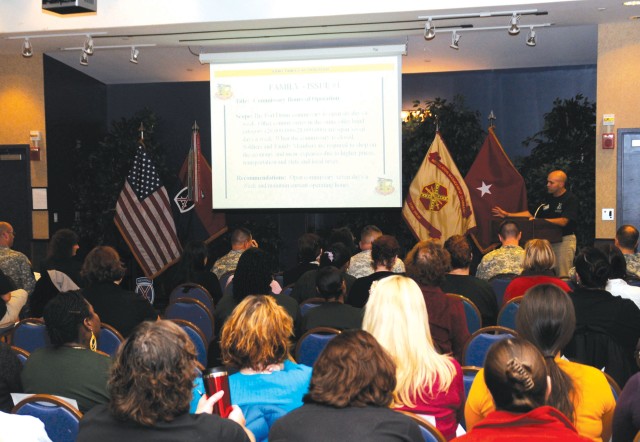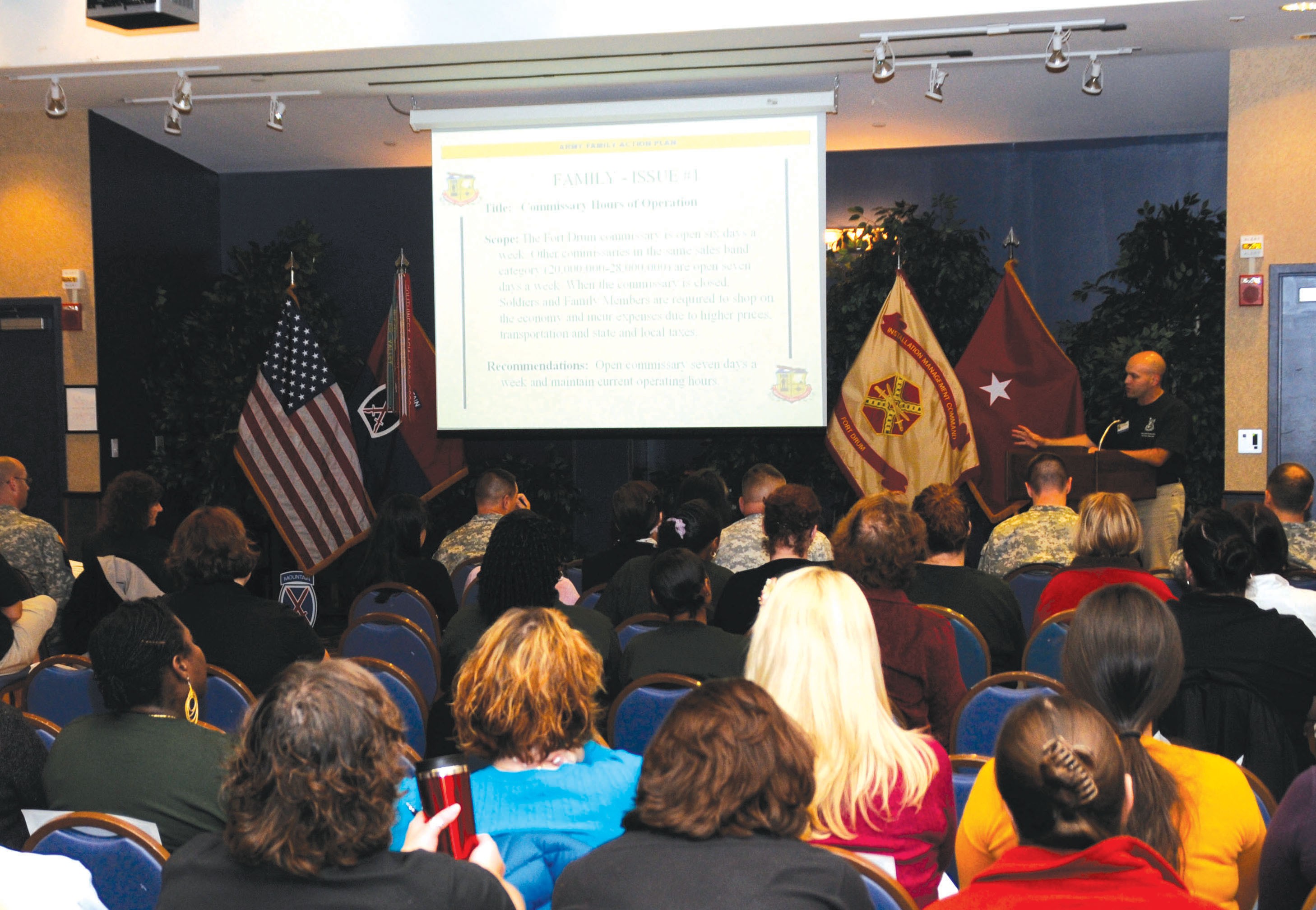FORT DRUM, N.Y. -- Members of the Fort Drum community came together last week with ideas for a better future.
The Army Family Action Plan is a grassroots-level effort to gather ideas for change to improve quality of life for those who have chosen the Army as a career. This year's three-day Fort Drum AFAP conference concluded Friday.
"This year was hugely successful," said Pikkwan Boston, AFAP coordinator. "We had fewer delegates than we did last year. And with fewer delegates, it helped things go by smoother and more quickly."
Through AFAP, changes in Army procedure, rules and regulations can be changed and modified to help create a better lifestyle for Soldiers, Army Families and Department of the Army civilians.
The AFAP process is divided into three sections: issues / ideas, scope or detailed explanation of issue; and recommended solutions.
Issues come from Soldiers, Family Members, retirees and DoD civilians. Scope and recommendations are developed locally at AFAP forums and conferences. Issues that can be resolved locally are addressed, while issues that cannot be resolved locally and may benefit the Army as a whole are sent forward to U.S. Army Forces Command and then on to Department of Army for further evaluation.
"These are always great," Boston said. "AFAP works. Last year, we had seven items go up to FORSCOM and two went all the way up to the Army level. So I foresee our issues this year doing exactly the same thing."
Fort Drum leaders expressed their appreciation to delegates for their time and efforts during the conference.
"I want to thank all of you for taking the time to come together to make this work," said Brig. Gen. Harry Miller, 10th Mountain Division (LI) rear commander. "You were very inclusive and exhaustive in the issues you raised and brought forward. Thank you all very much for your time and effort.
"This is a great process and a great conference designed to help our Families and our Soldiers," he added.
Another of Fort Drum's leaders talked about the enthusiasm displayed by those at the conference and how their current ideas can be future regulations.
"I loved being here this afternoon," said Judith Gentner, deputy to the garrison commander. "The energy and enthusiasm in this room is just great. I would love to can it and take it back with me.
"I am happy to be here and listen to your issues and what you have come up with to make Fort Drum, and our Army better," she continued. "Make no mistake; what you are doing and what you have done will make us better. We ask you to go away and educate others on the AFAP process and let them know how it works and how it is beneficial.
"I want to thank all the delegates for all your hard work," Gentner added. "Every one of your suggestions will be looked at by the command, and we will take to heart all of the suggestions made here this week."
For those participating in the idea sessions, the conference was seen as a great way to gather thoughts in a forum and let those in a position to make changes understand what members of the Fort Drum community see as issues.
"The three days here were fantastic," said Jenn Wright, AFAP conference delegate. "Very seldom do we get a chance to get such a great cross-demographic of people from our community to come together in a room to discuss issues.
"It was interesting to see all the different viewpoints and all the different issues come together, and this type of setting allows you to understand there are a lot of things going on across the installation," she added. "This will give us an opportunity to possibly fix some problems locally or at least get the information to those who may be able to do something at a higher level. We look forward to seeing what happens next."
During the conference, delegates chose the following as the top five issues:
Issue: Qualified medical specialists on Fort Drum
Scope: There is a lack of qualified medical specialists on Fort Drum. Patients are not receiving timely and accurate care and sometimes are misdiagnosed. ... This affects all patients using on-post medical facilities and Soldier performance, as it forces patients into multiple visits before they are properly diagnosed.
Recommendation: Increase the number of qualified medical specialists to ensure quality. Hire one civilian doctor (not military and does not deploy) per brigade to provide continuity of care. Provide supplemental training or professional development for health care professionals in the areas of patient diagnosis and film reading. Provide training on "how to write a specific medical profile."
Issue: Medical records at patient visits
Scope: There is no standard Department of Defense policy for utilization of patient records in the room at time of visit at the medical treatment facility. When records are not present at the time of visit, it creates repetition of patient information and delay of care and services. Presence of records during visit affords the opportunity for immediate correction or update of information and promotes continuity of care.
Recommendations: Create a policy that states any MTF provider will have the patient's medical records present during every patient visit.
Issue: Centralized teen outdoor recreation facility
Scope: Fort Drum does not have a centralized teen outdoor recreation facility. Current or existing facilities are geared towards small children or adults and/or difficult to access without motorized transportation. Teens do not have an outdoor facility in which to interact and socialize in a safe environment. The lack of this facility forces teens to hang out in unsafe locations.
Recommendations: Build an outdoor recreation facility for teens only (to include rock walls, large jungle gyms, zip lines, etc.). Designate a centralized teen recreation area near Visitor's Park or Po Valley / Mount Belvedere Shoppette. Include a diverse panel of teen representatives to aid in the development and design.
Issue: Surrendered and stray pets
Scope: Fort Drum does not have an on-site facility to house surrendered / stray pets. On Fort Drum alone, $70,000 was spent over a five-month period to pick up and process 467 stray pets. Fort Drum also has a 24-kennel facility that is not being utilized to house surrendered / stray pets. An on-site surrendered / stray pet facility will keep money in the Fort Drum community.
Recommendations: Establish a Fort Drum surrendered / stray pet facility.
Issue: Temporary housing for child visitations
Scope: According to Army Regulation 420-1, noncustodial single parents sergeant and below with limited child visitations are required to live in the barracks. These Soldiers do not have temporary housing for overnight visitations with their children. This forces Soldiers to rent hotels, and many are faced with financial hardships in order to have overnight visits with their children.
Recommendations: Establish temporary housing facilities for Soldiers who are exercising visitation privileges with their children.


Social Sharing